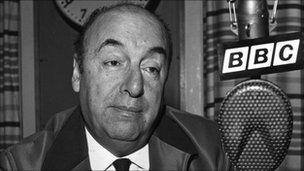Exhumation of Pablo Neruda's remains set for 8 April
- Published

Pablo Neruda, seen here on a visit to the BBC's Latin American service in 1965, was fiercely critical of the military
A court in Chile has set a date for the exhumation of the remains of the Nobel Prize-winning poet Pablo Neruda, as part of an inquest into his death.
International experts will begin their examinations on 8 April to determine whether the poet was poisoned in 1973.
The poet and left-wing activist died 12 days after a military coup replaced the socialist President Salvador Allende with General Augusto Pinochet.
The poet's family maintains that he died at 69 of advanced prostate cancer.
In 2011, Chile started investigating allegations by his former driver, Manuel Araya Osorio, that the poet had been poisoned.
Experts from Argentina and Spain will reportedly join observers from the International Red Cross on the exhumation works.
Spanish expert Francisco Etxeberria has told local media that he will be travelling to Chile.
'Shed light'
"Then we will take the tests that could shed light on the case," Mr Etxeberria told Diario Vasco. "It's been 40 years, but we have the means to shed much light."
Mr Neruda's body is buried next to his wife Matilde Urrutia in Isla Negra, 120km (70 miles) west of the capital Santiago.
Neruda was a Communist and a friend of President Allende.
But the foundation that guards his legacy says it believes Pablo Neruda died of cancer.
Neruda was a fierce critic of the military coup, which he saw as a betrayal of his country.
His death is not the only one from that period to be re-examined.
In December 2011, after the remains of President Allende were exhumed, it was confirmed that he committed suicide, and was not killed by soldiers who stormed the presidential palace during the coup, as some had argued.
- Published5 December 2011
- Published30 December 2011
- Published23 May 2011